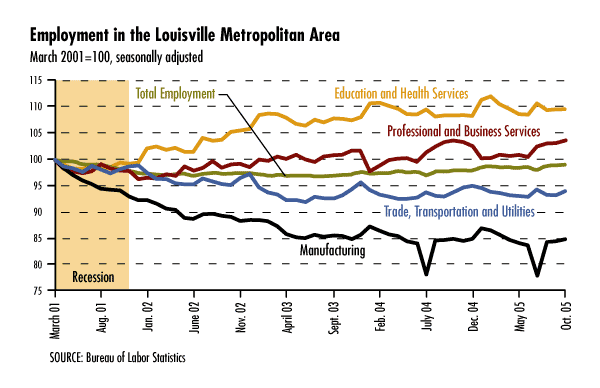District Overview: Job Cuts in Manufacturing, Transportation Slow Recovery
As in most other areas of the United States, the Louisville metropolitan statistical area (MSA) experienced a decline in payroll employment during the 2001 recession. Employment in the MSA decreased by 2.1 percent between March 2001 and November 2001, compared to a 1.4 percent decrease for the state of Kentucky and a 1.2 percent decrease for the United States during the same period. Some sectors in the Louisville MSA experienced only moderate employment losses, but employment in professional and business services, manufacturing, and the trade, transportation and utilities sector fell significantly during the recession. Although the professional and business services sector has rebounded since the end of the recession, job losses have continued in the manufacturing and in the trade, transportation and utilities sectors, preventing Louisville’s total employment from reaching its pre-recession level. As of October 2005, total payroll employment was 1.4 percent (8,550 jobs) lower than in February 2001, just before the recession started.

Growth Sectors
Despite the overall decline in Louisville’s employment since March 2001, two sectors have displayed substantial post-recession growth: leisure and hospitality, and education and health services. Between November 2001 and October 2005, employment in the leisure and hospitality sector increased by more than 10 percent (5,500 jobs), despite a decline of 1.3 percent during the recession. Leisure and hospitality is the second smallest sector in Louisville. (Natural resources and mining, not reported, is the smallest sector.) Employment in the education and health services sector experienced a similar trend. Although posting a nearly 1 percent decline between March 2001 and November 2001, employment in the education and health services sector increased by 10.5 percent (7,100 jobs) between November 2001 and October 2005.
The financial services sector has also seen post-recession employment growth, although not as much as in the leisure and hospitality and the education and health services sectors. Employment in financial services increased by 4.2 percent (1,600 jobs) between November 2001 and October 2005 despite a decline of roughly 0.5 percent during the 2001 recession.
The professional and business services sector experienced the second largest recessional job loss, of 2.1 percent (1,400 jobs). However, employment in that sector increased by 6 percent (3,800 jobs) between November 2001 and October 2005. Despite employment growth in this sector and the aforementioned sectors, falling employment in manufacturing and in the trade, transportation and utilities sector since March 2001 has prevented Louisville’s total employment from reaching pre-recession levels as of October 2005.
Struggling Sectors
Of all sectors experiencing a decline in employment during the recession, manufacturing sustained the biggest blow. Payroll employment in manufacturing decreased by 7 percent during the recession and has continued to decline. Between November 2001 and October 2005, employment in manufacturing decreased by roughly 9 percent (7,800 jobs). As of October 2005, manufacturing employment was roughly 19 percent below its pre-recession level, which is about the same for the manufacturing sector in the nation as a whole. Because the manufacturing sector is the second largest with respect to Louisville’s total employment, the loss of 14,400 manufacturing jobs since the recession has significantly stunted Louisville’s post-recession recovery.
Trade, transportation and utilities, the largest sector in the Louisville economy, lost a smaller percentage (1.3 percent, or 1,850 jobs) of its total employment during the recession compared to the manufacturing sector. Similar to employment in the manufacturing sector, employment in trade, transportation and utilities has continued to decline since November 2001. As of October 2005, employment in trade, transportation and utilities was 4.7 percent (6,600 jobs) lower than at the recession’s end.
Conclusion
As evidenced by the overall loss of 6,350 jobs since March 2001, total employment in the Louisville MSA has been unable to make positive gains since the end of the 2001 recession. The recessional job losses in the professional and business services, manufacturing, and trade transportation and utilities sectors, along with the subsequent employment decreases in the latter two since November 2001, have outweighed the employment gains made in other sectors since the end of the recession.
Views expressed in Regional Economist are not necessarily those of the St. Louis Fed or Federal Reserve System.
For the latest insights from our economists and other St. Louis Fed experts, visit On the Economy and subscribe.
Email Us

